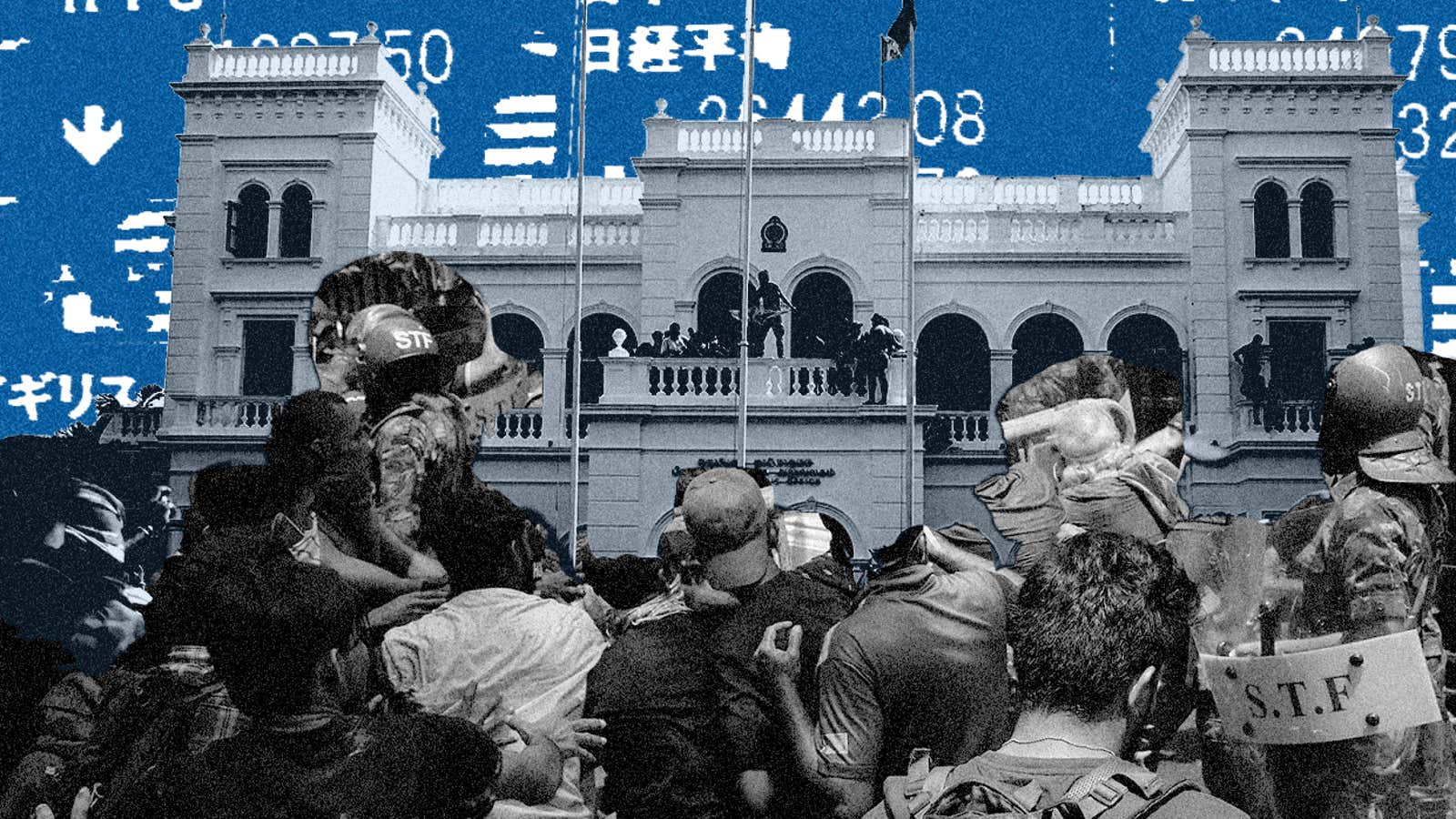
Hi Quartz members,
Sri Lankans this week successfully ousted president Gotabaya Rajapaksa, who sent his resignation on Thursday by email from Singapore like a “Wish you were here!” postcard. He escaped the protestors swimming in his pool and any further accountability for Sri Lanka’s economic collapse. Already in default, the nation once seen as a model for free-market capitalism in south Asia now warns the “whole country will be shut down” if it can’t get financing for food and fuel, while prices are up more than 50% from last year. The island’s 22 million people could face famine within months.
Every debt crisis is just a succession of rational, selfish, short-term decisions. In Sri Lanka, after its civil war ended in 2009, foreign investors and governments were eager to lend money at low rates, fueling a decade of growth under the corrupt Rajapaska family, which cut taxes instead of shoring up the economy while it could.
When the pandemic suddenly erased tourism revenue in 2020, the government started running out of dollars and other currencies to pay foreign debts. It had plenty of Sri Lankan rupees, of course, but selling those abroad couldn’t make up the difference, and devalued the currency by half in the process, causing prices to spiral upward. Sri Lanka, which simply stopped making debt payments in April, has $7 billion in loans coming due this year and less than $1 billion in foreign currencies to pay them. The IMF says it’s willing to intervene but doesn’t even know with whom it should negotiate.
You don’t have to squint much to see a familiar story in Sri Lanka’s collapse. Many emerging markets face the same combination of staggering debt, dwindling currency reserves, declining revenue, and rising prices. Zambia, Lebanon, and Suriname have already missed payments and defaulted like Sri Lanka. A long list of others could join them if economic conditions don’t improve. Pakistan, one of the largest among them, got a $6 billion bailout from the IMF on Thursday to avoid default for the time being.
What Sri Lankans need most right now is humanitarian aid, and the UN’s World Food Programme is worthy of support. What the rest of us need is to realize is that—for all the focus on avoiding a recession in the US or Europe—a wide swath of emerging economies are facing ruin either way.
The backstory
- Nations classified as emerging markets owe $1.4 trillion to foreign bondholders, Bloomberg estimates. About a fifth of that debt is currently distressed, meaning creditors think they may never get repaid.
- This round of distress began with the coronavirus pandemic, which led investors to flee emerging markets, prompting fears of default from Brazil to Thailand.
- But when the US pushed interest rates close to zero, cheap money flowed back into those countries and temporarily eased the crisis. In May 2020, G20 nations also agreed to suspend debt payments they were owed by the world’s most fragile economies.
- That global rent freeze ended in December 2021, and the US has recently been racing to raise interest rates in ever-larger increments. The best-case scenario for the global economy now is just not to shrink.
- With the economic tides going out again, poor countries that owe lots of money are incredibly vulnerable, and their creditors do not seem inclined to leniency.
Haven’t I heard this before?
Emerging-market debt crises can seem like a permanent fixture of the global economy, which means they have a hard time getting attention. It doesn’t help that many of the same countries keep finding themselves in distress. (Yes, Argentina is among those back on default watch.) But there’s a lot to be learned from prior crises that could help break the damaging boom-and-bust cycles in emerging markets.
Take the Mexican peso crisis of 1994. In the good times leading up to it, Mexico had easy access to credit, which kept the peso strong, which allowed for more borrowing. Then, as now, the US was hiking interest rates to keep its own economy from overheating. Things were too good. But slowdowns in developed economies can easily become crashes in emerging ones, as a recent article from the Dallas Fed showed. The US rate hikes suddenly made lending to Mexico a bad investment, which made the peso less valuable, which it even harder to borrow money. Which is how the US found itself having to orchestrate a $50 billion bailout for its southern neighbor.
What to watch for next
- Egypt has nearly as much debt as its GDP. It has to make $16 billion in debt payments this year and next, more than any other emerging market. A weakening currency makes it harder to finance infrastructure projects like a new $60 billion capital city. The backup plan is to sell minority stakes in state-owned businesses.
- Several other African countries, including Ethiopia, have already sought to restructure their debt under a new “common framework” developed by the G20, but that has gone nowhere because the countries can’t actually agree on the framework. “This is a topic we cannot have complacency on,” IMF chief Kristalina Georgieva said recently, implying that’s exactly what will happen.
- Don’t forget that several emerging markets at currently at war. Russia and Belarus have already defaulted, thanks to sanctions making it impossible to pay their debts. Ukraine, of course, will need to finance a continuing defense and, one hopes, the rebuilding of its country.
- The World Bank’s director of macroeconomics predicts that a dozen emerging markets will default this year. The broader economy will survive. But countries with debt currently trading in distress are home to nearly a billion people.
Oh, right, also: China
Looming over most of these debt crises is China’s role as one of the largest lenders to emerging markets. It’s often not clear how much sovereign debt China holds, nor the terms it has extracted for money under its “Belt and Road” lending program. That makes China a complicated party in debt restructurings, more akin to a vulture fund than economic partner.
In the current crisis, China has already held up attempts at debt relief. Zambia can’t renegotiate the $17 billion debt payment it missed in 2020 unless its other creditors agree; so far, China won’t. China’s intentions for Sri Lanka’s debt restructuring are equally opaque. Beijing holds enormous leverage in this crisis, in part because no one quite knows how much leverage it has.
One 🔜 thing
Lee Buchheit spent most of his career representing countries in default, including Greece, which still holds the record for the largest sovereign-debt restructuring. He rejects generalizations about his clients—except, he says, that all debtors suffer from “pathological procrastination.” He told the Financial Times, “They delay it far beyond the point that anyone would think the situation is reversible. It is a testament to the belief in the efficacy of prayer.”
Quartz stories to spark conversation
- Find the closest unionized Starbucks to you with this map
- The coming chickpea shortage could affect far more than hummus
- Airlines are piloting a program to sell “zero carbon” flights
- The White House’s BA.5 variant plan is to do everything that didn’t work before
- The euro may be historically cheap, but your European vacation won’t be
- What’s the best case—OK, least bad—scenario for Twitter?
5 great stories from elsewhere
🔭 Space picks. The photos that NASA published this week, the first from its new James Webb Telescope, are absolutely mind-blowing. But someone had to sift through all the images the satellite had returned since its launch late last year. The New York Times takes you into the room where experts made those choices—and struggled to keep those incredible images to themselves.
💼 Worker woes. For the past few years, Chinese internet companies like Tencent and Alibaba have come under renewed government scrutiny, stunting their earlier expansion. Now, Rest of World reports, workers are getting laid off or seeing job offers rescinded, though not everyone is unhappy to take a break from China’s grueling work culture.
✌️ Medium departure. After a decade at the helm of content platform Medium, founder Ev Williams announced this week that he’s stepping down. The Verge digs into his legacy—and the challenge his replacement will face in finding new directions for a company that has seemingly tried everything.
📱 QR chaos. With an event like the Champions League final, which took place in Paris in May, you’d expect the play-by-play to be limited to the game itself. But this in-depth BBC story instead details the failures that led to the dangerous scrum of fans outside the stadium, and raises questions about the future security of now-ubiquitous QR codes.
🧑🍳 Bear answers. The restaurant-focused dramedy The Bear just wrapped up its first season and was quickly renewed for a second one. Vulture did a great Q&A with lead Jeremy Allen White that will help you understand the many subtle meanings of, “Yes, Chef.”
Thanks for reading! Please note that there won’t be an edition of The Forecast tomorrow (Sunday, July 17). Don’t hesitate to reach out with comments, questions, or topics you want to know more about.
Have a hopeful weekend,
—Zachary M. Seward, editor-in-chief
Additional contributions by Alex Ossola and Julia Malleck.
